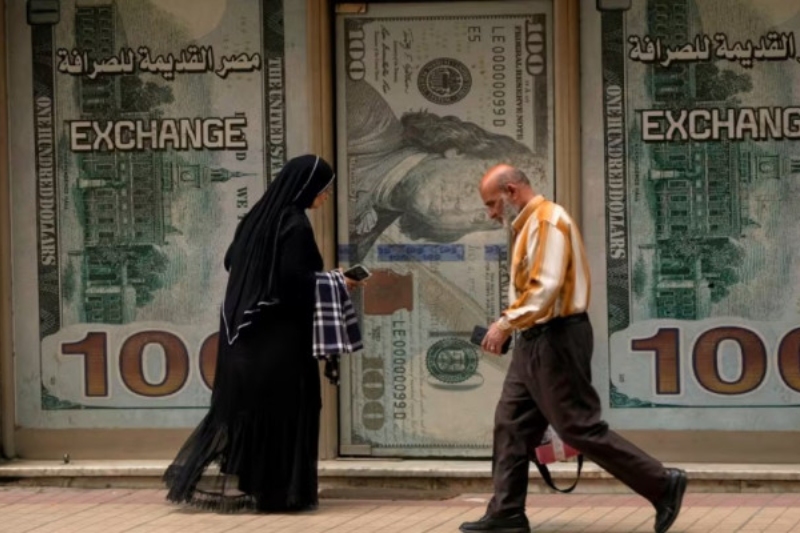Egypt’s IMF Deal and Financial Landscape
Prime Minister Moustafa Madbouly announced on Wednesday that Egypt has successfully negotiated with the International Monetary Fund (IMF) to increase its bailout loan from $3 billion to $8 billion. This crucial agreement comes after months of discussions and is expected to provide much-needed financial support for the country’s struggling economy. The deal not only enhances the IMF loan but also opens doors for Egypt to access additional loans from institutions such as the World Bank.
The Central Bank’s Swift Measures and Currency Impact
In a bid to meet the IMF’s key demands, Egypt’s Central Bank took swift measures, raising its main interest rate and floating the currency. Within hours of this move, the Egyptian pound lost more than 60% of its value against the US dollar. Commercial banks quickly adjusted their exchange rates, trading the dollar at over 50 pounds, a significant jump from the previous rate of about 31 pounds for the dollar. The central bank increased the key interest rate by 600 basis points to 27.75%, aiming to combat inflationary pressures and attract foreign investment.
Economic Challenges Amid Multiple Crises
The Egyptian economy has been grappling with a series of challenges, including government austerity measures, the impact of the COVID-19 pandemic, the fallout from the war in Ukraine, and recent tensions from the Israel-Hamas conflict in Gaza. The war in Ukraine, in particular, has hit Egypt hard, as the country heavily relies on imports, especially for essential commodities like wheat. With a population exceeding 104 million, ensuring a stable food supply has become a pressing concern.
Keep Reading
The Rationale Behind the IMF Deal
Egypt’s decision to seek an expanded bailout from the IMF reflects a strategic move to bolster its economic resilience amid a complex web of challenges. The $8 billion deal not only injects much-needed liquidity into the system but also serves as a vote of confidence in the country’s commitment to implementing crucial economic reforms. The negotiations were likely multifaceted, involving discussions on fiscal policies, structural reforms, and measures to stimulate sustainable growth. This landmark agreement positions Egypt to navigate the storm of economic uncertainties and lays the groundwork for a more robust financial future.
The Central Bank’s Balancing Act: Taming Inflation and Attracting Investments
The Central Bank’s bold decision to raise interest rates and float the currency is a delicate balancing act aimed at addressing pressing issues within the Egyptian economy. The move to increase the key interest rate by 600 basis points demonstrates a commitment to curbing inflationary pressures, a pivotal concern given the recent economic shocks. Simultaneously, by allowing the currency to float, Egypt aims to make its exports more competitive, potentially attracting foreign investments. While the immediate impact is a sharp devaluation, the long-term goal is to create a more flexible and attractive economic environment for investors.
Navigating Global Headwinds: A Comprehensive Approach
Egypt’s economic challenges are not isolated but rather intertwined with global events, from the enduring ramifications of the COVID-19 pandemic to the repercussions of conflicts in Ukraine and Gaza. The country’s vulnerability as the world’s largest wheat importer has been starkly highlighted, underscoring the need for comprehensive strategies to secure essential resources. As Egypt positions itself for recovery, it becomes imperative to address not only immediate financial concerns but also to craft policies that build resilience against unforeseen global shocks. The success of these endeavors will determine how effectively Egypt can steer through the multifaceted challenges and emerge stronger on the global economic stage.
Forging a Path Forward Amid Uncertainty
Egypt’s dynamic approach, reflected in the expanded IMF deal and the Central Bank’s decisive measures, underscores a commitment to charting a resilient path forward. As the country grapples with the complex interplay of internal and external economic forces, the success of these initiatives will hinge on effective implementation, adaptability, and sustained global cooperation. The journey to economic recovery demands not only immediate solutions but a forward-looking vision that positions Egypt as a formidable player in the evolving landscape of international finance.
A significant step in addressing the economic turmoil made worse by various external factors is Egypt’s pursuit of an $8 billion bailout from the IMF. Despite the fact that the Central Bank’s actions immediately devalued the currency, it is believed that these actions were necessary to stabilize the economy and draw in foreign investment. As Egypt strives to recover from the impacts of austerity, the pandemic, and global conflicts, the success of these financial maneuvers will play a crucial role in determining the country’s economic trajectory.

